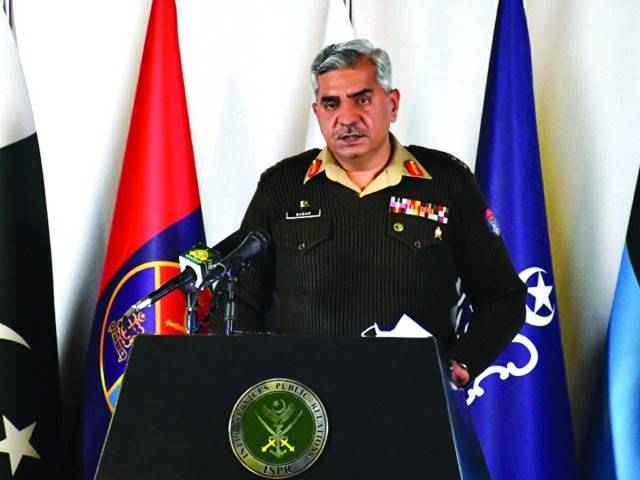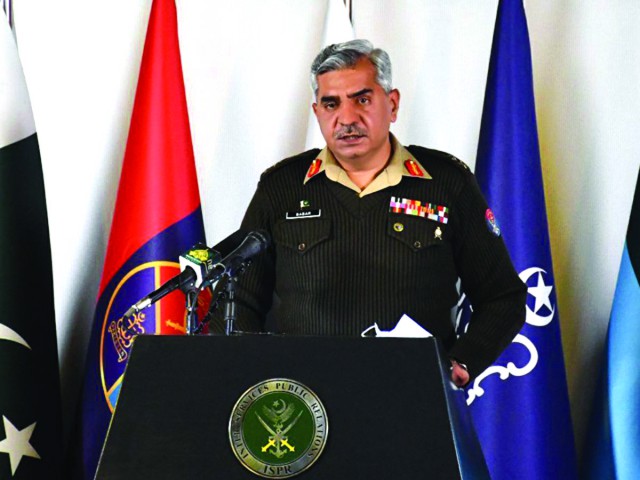
Unlike his predecessor, military’s chief spokesman Major General Iftikhar has so far admirably refrained from falling prey to exaggeration, bombast and a penchant for self-projection. But he could keep the poise only until the other day, when he found it necessary to respond to the remarks of PDM chief Maulana Fazalur Rehman. Uncharacteristically, the spokesman lost both balance and objectivity.
In a press talk on Monday, the military’s spokesman rejected the opposition’s criticism of the army meddling in politics, saying that there was no justification for a march to Rawalpindi by the opposition alliance. In cryptic remarks that were also meaningful, he said that if the opposition decided to come to Rawalpindi, they would be served “chai pani” (tea and water), whatever this choice of words meant.
The wily Maulana also lost no time quickly posting a counter riposte: “Why only tea for the opposition and pizzas for themselves?” he asked. In saying this, Maulana said what a thousand words could not have.

This aspect part of the press talks aside, the categorical rejection of allegations of manipulation of 2018 polls, the claim that “we conducted the elections with full responsibility and honesty” and the advice that “if anyone has any doubt, then national institutions are functional and can be approached” cannot be glossed over. Nor can the assertion that “the army does not need to enter into the political fray, nor should it be dragged into it” be lightly ignored or expected to be believed by the people simply because a uniformed officer has uttered them.
While uttering these words, the spokesperson did not realise that besides current realities, the weight of history, the pronouncements of the highest courts, the debates in the parliament and the confessions of some army generals all belie the claims made by him. How can anyone in good conscience deny the overbearing political role of the military in a country that has seen direct military rule for almost half of its independent existence? How can one deny the cobbling of political parties under IJI to achieve some political objectives? Has it not been admitted by a former ISI chief and a verdict not given by the SC?
Direct repeated military coups aside, how can anyone deny the backseat driving by the military when direct rule became unfashionable and lost international acceptability? How can one deny the disturbing tendency of the army to capture civil posts as well as the commanding heights of national economy?
The most glaring example of capturing civil positions is that of the position of DG Military Lands and Cantonments, that is headed by a serving major general against all rules and regulations for the past over two decades, disregarding court observations and dismissing pleas by the parliament. The DG MLC is the federal government’s representative to keep an eye on how the state lands leased to defense services for specific needs are actually used by them. DG MLC is a regulator of lands used by the defense forces. By forcibly taking over this post, the user has also become the regulator of state lands. No wonder that fingers have been raised at the way military lands have been used and allotted during the past.
As a result of systematic inroads in the national economy, the DHAs have become the county’s largest real estate developer, FWO the largest contractor, the Fauji Foundation the largest business, industrial and commercial conglomerate and NLC one of the largest, if not the largest, transporter. Recently, the FWO also entered into the oil business through a subsidiary.
The signing of the Charter of Democracy by two major political parties in 2006 paved the way for some significant political and constitutional advancements. The peaceful and democratic transition of power after general elections, the 18th constitutional amendment, provincial autonomy and the NFC award are some of the major achievements of the past decade. It appears that this is not liked by the military establishment as it means ceding some power. As a result, a new model of governance of backseat driving and hybrid governance is being perfected.
The military calling the shots is not a figment of imagination. It is a reality. It must be admitted to be tackled. Former US Secretary of State Hillary Clinton’s recent remarks calling Pakistan a ‘deep state’ where military and intelligence agencies are calling the shots from behind the scenes sums up the reality of today’s Pakistan.
Who can forget the Faizabad dharna in November 2017 when violent religious zealots converged on the capital threatening the civilian elected government? They dispersed only after the army brokered an agreement that literally humiliated the civilian government. A senior military officer in uniform was caught on a video clip distributing cash among the zealots as their ‘travel expenses.’ Supreme Court Judge Qazi Faez Isa gave a landmark judgment in the case. Instead of implementing the verdict, Qazi Isa found himself chased through a presidential reference against him.
The army’s spokesman said that the army only supported the nationwide electoral exercise in 2018 by providing security and dismissed all allegations of electoral manipulations. One wishes he had read the international observers’ reports about how the pitch was manipulated to the disadvantage of some marked political parties.
The military interfering in politics in utter disregard of the Constitution and the law and crafting of the hybrid system is a reality that cannot be wished away by repeating stock phrases. If it wishes not to be dragged into politics, the military must disavow its political role.
The writer is a former senator
In a press talk on Monday, the military’s spokesman rejected the opposition’s criticism of the army meddling in politics, saying that there was no justification for a march to Rawalpindi by the opposition alliance. In cryptic remarks that were also meaningful, he said that if the opposition decided to come to Rawalpindi, they would be served “chai pani” (tea and water), whatever this choice of words meant.
The wily Maulana also lost no time quickly posting a counter riposte: “Why only tea for the opposition and pizzas for themselves?” he asked. In saying this, Maulana said what a thousand words could not have.

This aspect part of the press talks aside, the categorical rejection of allegations of manipulation of 2018 polls, the claim that “we conducted the elections with full responsibility and honesty” and the advice that “if anyone has any doubt, then national institutions are functional and can be approached” cannot be glossed over. Nor can the assertion that “the army does not need to enter into the political fray, nor should it be dragged into it” be lightly ignored or expected to be believed by the people simply because a uniformed officer has uttered them.
While uttering these words, the spokesperson did not realise that besides current realities, the weight of history, the pronouncements of the highest courts, the debates in the parliament and the confessions of some army generals all belie the claims made by him. How can anyone in good conscience deny the overbearing political role of the military in a country that has seen direct military rule for almost half of its independent existence? How can one deny the cobbling of political parties under IJI to achieve some political objectives? Has it not been admitted by a former ISI chief and a verdict not given by the SC?
Direct repeated military coups aside, how can anyone deny the backseat driving by the military when direct rule became unfashionable and lost international acceptability? How can one deny the disturbing tendency of the army to capture civil posts as well as the commanding heights of national economy?
The most glaring example of capturing civil positions is that of the position of DG Military Lands and Cantonments, that is headed by a serving major general against all rules and regulations for the past over two decades, disregarding court observations and dismissing pleas by the parliament. The DG MLC is the federal government’s representative to keep an eye on how the state lands leased to defense services for specific needs are actually used by them. DG MLC is a regulator of lands used by the defense forces. By forcibly taking over this post, the user has also become the regulator of state lands. No wonder that fingers have been raised at the way military lands have been used and allotted during the past.
How can anyone in good conscience deny the overbearing political role of the military in a country that has seen direct military rule for almost half of its independent existence?
As a result of systematic inroads in the national economy, the DHAs have become the county’s largest real estate developer, FWO the largest contractor, the Fauji Foundation the largest business, industrial and commercial conglomerate and NLC one of the largest, if not the largest, transporter. Recently, the FWO also entered into the oil business through a subsidiary.
The signing of the Charter of Democracy by two major political parties in 2006 paved the way for some significant political and constitutional advancements. The peaceful and democratic transition of power after general elections, the 18th constitutional amendment, provincial autonomy and the NFC award are some of the major achievements of the past decade. It appears that this is not liked by the military establishment as it means ceding some power. As a result, a new model of governance of backseat driving and hybrid governance is being perfected.
The military calling the shots is not a figment of imagination. It is a reality. It must be admitted to be tackled. Former US Secretary of State Hillary Clinton’s recent remarks calling Pakistan a ‘deep state’ where military and intelligence agencies are calling the shots from behind the scenes sums up the reality of today’s Pakistan.
Who can forget the Faizabad dharna in November 2017 when violent religious zealots converged on the capital threatening the civilian elected government? They dispersed only after the army brokered an agreement that literally humiliated the civilian government. A senior military officer in uniform was caught on a video clip distributing cash among the zealots as their ‘travel expenses.’ Supreme Court Judge Qazi Faez Isa gave a landmark judgment in the case. Instead of implementing the verdict, Qazi Isa found himself chased through a presidential reference against him.
The army’s spokesman said that the army only supported the nationwide electoral exercise in 2018 by providing security and dismissed all allegations of electoral manipulations. One wishes he had read the international observers’ reports about how the pitch was manipulated to the disadvantage of some marked political parties.
The military interfering in politics in utter disregard of the Constitution and the law and crafting of the hybrid system is a reality that cannot be wished away by repeating stock phrases. If it wishes not to be dragged into politics, the military must disavow its political role.
The writer is a former senator

